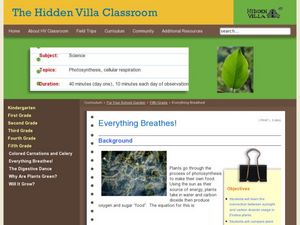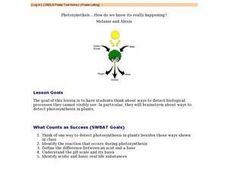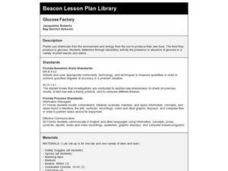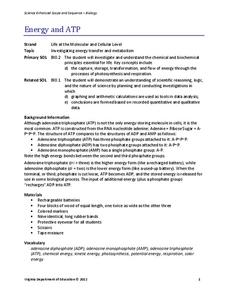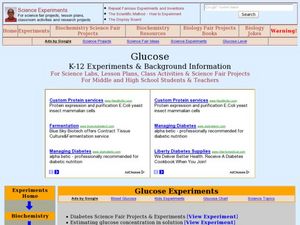Curated OER
Everything Breathes!
Fifth graders test plants in the dark and in the light to see which grows better and produces more carbon dioxide. In this plants lesson plan, 5th graders also create ways for plants to go through photosynthesis that they can observe.
Curated OER
The Carbon Cycle
Here is an interesting science lesson. Pupils discover that carbon, just like water, is absolutely necessary for all living things to survive. They study how it cycles through nature, become familiar with the periodic table, and look at...
Curated OER
Photosynethsis....How do we know it's really happening? - Biology Teaching Thesis
Students think of one way to detect photosynthesis in plants besides those ways shown in class. They identify the reaction that occurs during photosynthesis. Students define the difference between an acid and a base. They identify acidic...
Global Change
The Carbon Cycle and its Role in Climate Change
So how does the carbon cycle work? Kids participate in a hands-on activity that allows them to understand the chemistry behind climate change and global warming. They act out the process of photosynthesis by labeling themselves as...
Curated OER
Glucose Factory
Fourth graders determine, through laboratory activity, the presence or absence of glucose in a variety of plant leaves and stems. They work in groups and perform a three part laboratory which shows them how plants convert sunlighht to food.
Serendip
Food Webs, Energy Flow, Carbon Cycle, and Trophic Pyramids
The reintroduction of a species to an area doesn't always go as expected. Scholars learn about the reintroduction of wolves into Yellowstone National Park with a video, reading, and discussion questions. They complete a hands-on activity...
Virginia Department of Education
Energy and ATP
Take charge of your biology class by using this exciting analogy to relate the ATP process with batteries. Pupils use batteries and rubber bands to simulate the phosphate bonds between molecules in the body. They measure the distance in...
NASA
The Cycle of Matter
An educational lesson focuses on the idea of conservation of matter through a demonstration of the water cycle, a discussion of digesting food, and the path of carbon and oxygen atoms as they change form.
Curated OER
Mutualism and Co-evolution A study of Flowering Plants and their Pollinators: Biology, Plants
These lessons use a variety of methods and approaches to teach flowering plant biology which includes seed germination; plant growth and food production through photosynthesis; plant transpiration and respiration; sexual reproduction...
Chicago Botanic Garden
The Carbon Cycle
There is 30 percent more carbon in the atmosphere today than there was 150 years ago. The first lesson in the four-part series teaches classes about the carbon cycle. Over two to three days, classes make a model of the cycle, add missing...
Curated OER
Glucose
High schoolers conduct various experiments on glucose. For this biology lesson, students differentiate the process of diffusion and osmosis. They test different foods for the presence of glucose and starch.
Curated OER
Microbial Influence on Earth's Systems
Students identify the different biogeochemical cycles on Earth. In this biology lesson, students observe microbes under a microscope. They compare and contrast respiration and photosynthesis.
Curated OER
Energy Extravaganza
Tenth graders study how cells and organisms acquire and release energy through photosynthesis and cellular respiration. They explain that living organisms use matter and energy to synthesize a variety of organic molecules and they will...
Curated OER
Food Web Follies
Seventh graders cut and paste animal pictures to create a food web and trace the path of energy. They write a paragraph explaining the importance of photosynthesis in all food webs.
Curated OER
What Do Plants Need?
Students experiment with plants. In this plant lesson, students research the needs of plants. Students determine if all plants have the same requirements for growth. In small groups, students experiment with different plants.
Forest Foundation
The Nature of Trees
Young botanists examine the different parts of tress and then draw parallels between the functions of these parts and the function of parts of the human body.
California Academy of Science
Carbon Cycle Role Play
Anytime you make concepts clear with role playing or hands-on experience, it's a win for the whole class. Ping-Pong balls are used to represent carbon in a carbon cycle role-play activity. In small groups, children first discuss what...
Serendip
Food, the Carbon Cycle and Global Warming
As the world population increases, demands on the carbon cycle also increase. A well-designed lesson first explores the greenhouse effect and its impact on global warming. Further sections have pupils study the effect of greenhouse gases...
Curated OER
Energy, Matter, and Organization
Tenth graders review the Energy, Matter, and Organization unit. They have one week to complete an essay. Students must submit a concept map or drawing. The activity is introduces by reading a short story line which presents a simple...
Curated OER
What Contains Carbon?
Young scholars explore elements by analyzing everyday objects and materials in class. In this carbon lesson plan, students define several vocabulary terms such as carbon dioxide, hydrocarbon, and carbonate. Young scholars view a group of...
Curated OER
Carbon Dioxide - Sources and Sinks
Where does all of the carbon dioxide come from that is supposedly leading to climate change? Earth science pupils test animal, plant, and fossil fuels as sources in this investigation. Using an indicator, BTB, they are able to detect the...
Curated OER
Teaching about Increased Conductivity: Are Culverts The Culprits?
High schoolers encounter the complexity of identifying the cause of unusual variations in WOW conductivity data. They propose theories on why there was a sudden increase in conductivity in Ice Lake, Minnesota during July of 1998.
Curated OER
Biochemical Cycles: Recycling Carbon and Nitrogen
Students construct flow diagrams of the carbon and nitrogen cycle processes. They identify sequences in each cycle that are affected by human impact and present their research to the class.
Curated OER
Weather Lesson 1
Students describe and compare the layers of the atmosphere. They explain how to measure the temperature of the atmosphere. They also explain what causes the atmosphere to heat up in some places more than in others.


